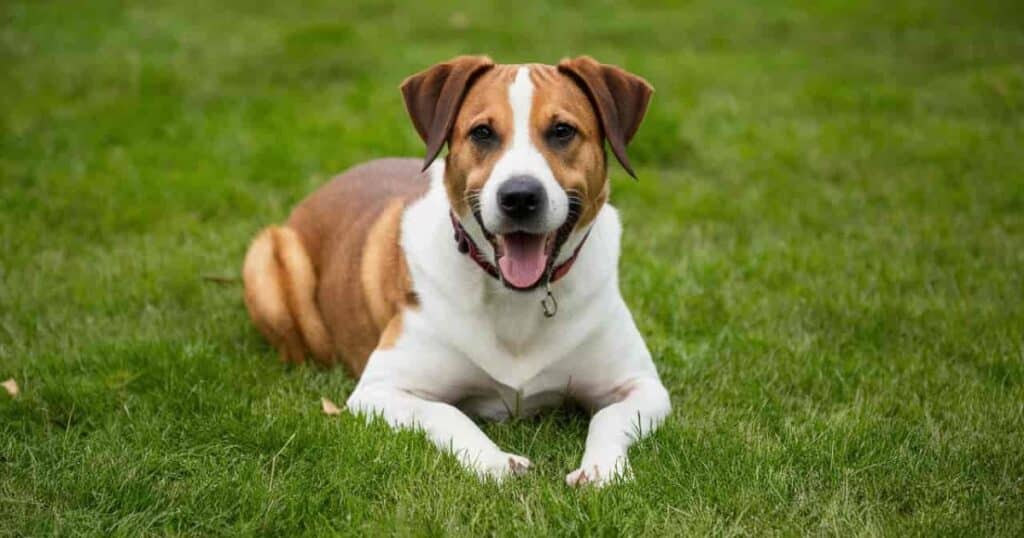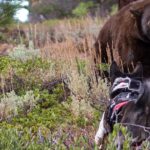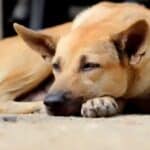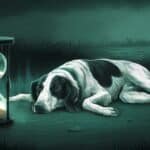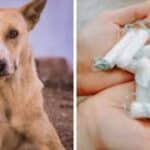As a dog owner, witnessing your furry friend consuming goose droppings can be an unpleasant and concerning experience. While it may seem harmless at first, ingesting goose feces can potentially expose your canine companion to various health hazards. In this comprehensive guide, we’ll explore the reasons behind this behavior, the risks involved, and the necessary steps to take if your dog has consumed goose poop.
Understanding Why Dogs Eat Goose Droppings
The Attraction of Dogs to Eat Goose Poop
Dogs are naturally curious creatures with a strong scavenging instinct. Their sense of smell is incredibly powerful, and they are often drawn to unusual odors, including those emitted by goose droppings. Additionally, some dogs may perceive goose feces as a potential source of nutrients, leading them to consume it.
It’s essential to understand that this behavior is not necessarily indicative of a dietary deficiency or a lack of proper training. Many factors contribute to a dog’s desire to eat goose poop, including:
- Curiosity and exploration: Dogs are naturally inquisitive animals, and their curiosity often leads them to investigate and taste unfamiliar objects or substances, including goose droppings.
- Scavenging instincts: As descendants of wolves and other wild canids, dogs have retained a strong instinct to scavenge for food. Goose feces may trigger this instinct, leading them to investigate and consume the droppings in search of potential nutrients.
- Perceived nutritional value: While goose droppings may not have significant nutritional value for dogs, their keen sense of smell may detect traces of undigested food or other organic matter, prompting them to consume the feces.
- Boredom or lack of mental stimulation: Dogs that are bored or lack adequate mental and physical stimulation may engage in undesirable behaviors, such as consuming goose droppings, as a way to alleviate their boredom and satisfy their curiosity.
- Underlying medical conditions: In some cases, a dog’s desire to eat non-food items like goose poop may be indicative of an underlying medical condition known as pica, a disorder characterized by an appetite for non-nutritive substances.
It’s crucial to note that while this behavior may seem unappetizing to humans, it is a natural and instinctive response for dogs. However, understanding the reasons behind it can help owners take appropriate measures to discourage this behavior and protect their pets’ health.
MORE POST: How Much Does It Cost To Own A Labrador Retriever In 2024? The Complete Price Guide
How Much Goose Poop is Harmful to Dogs
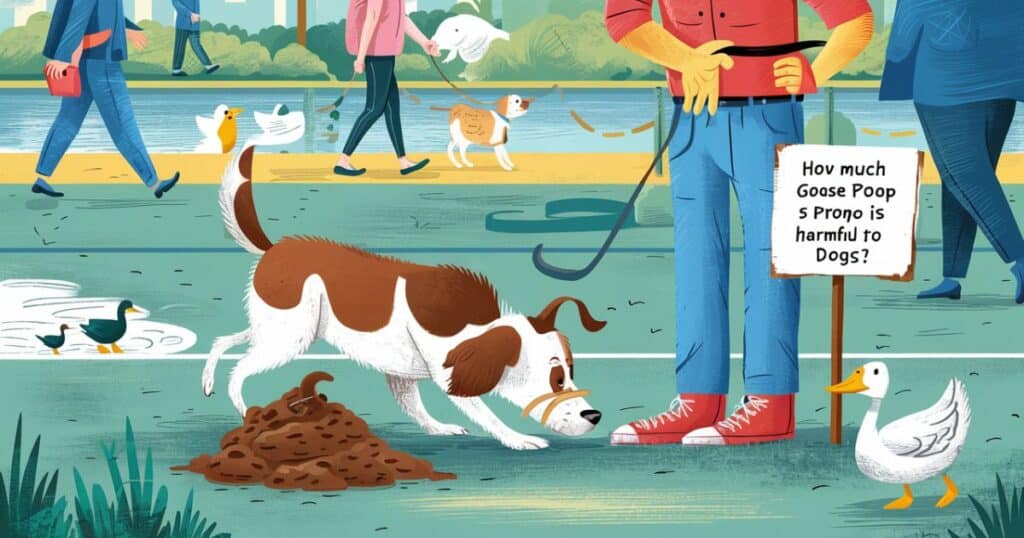
The amount of goose poop that can be considered harmful to dogs varies depending on several factors, including the dog’s size, age, and overall health condition. Generally speaking, ingesting small amounts of goose droppings may not cause significant harm to most healthy adult dogs. However, consuming larger quantities or repeated ingestion can increase the risk of adverse effects.
It’s crucial to note that puppies, senior dogs, and dogs with compromised immune systems or underlying health conditions may be more susceptible to the potential hazards of consuming goose feces.
According to veterinary experts, even a small amount of goose droppings can potentially expose a dog to harmful pathogens, especially if the feces are fresh and contain higher concentrations of bacteria or parasites. However, the severity of the risk largely depends on the individual dog’s overall health and immune system’s ability to fight off potential infections.
“While it’s difficult to pinpoint an exact ‘safe’ amount of goose poop for dogs to consume, it’s generally best to discourage this behavior altogether and seek veterinary advice if your dog has ingested any amount of goose feces,” advises Dr. Sarah Thompson, a veterinarian with over 15 years of experience.
Goose Poop Can Harm Your Dog
Bacteria and Parasites in Goose Droppings
Goose droppings can harbor a variety of harmful bacteria and parasites that can pose significant health risks to dogs. Some of the common pathogens found in goose feces include:
- Salmonella: This bacteria can cause salmonellosis, a potentially severe gastrointestinal illness characterized by diarrhea, vomiting, fever, and abdominal cramps. Salmonella infections can be particularly dangerous for puppies, senior dogs, and those with compromised immune systems.
- Campylobacter: Another bacterial pathogen that can lead to campylobacteriosis, a condition marked by diarrhea (sometimes bloody), fever, and abdominal pain. Campylobacter infections can also cause more severe complications, such as reactive arthritis or neurological disorders, in some cases.
- Giardia: A parasitic protozoan that can cause giardiasis, a gastrointestinal infection characterized by diarrhea, abdominal cramps, and weight loss. Giardia infections can be particularly challenging to treat and may require multiple courses of medication.
- Cryptosporidium: A microscopic parasite that can cause cryptosporidiosis, a diarrheal disease that may be particularly severe in immunocompromised individuals or young puppies.
- Escherichia coli (E. coli): Certain strains of E. coli found in goose droppings can cause gastrointestinal illness, including diarrhea, vomiting, and abdominal cramps.
These pathogens can be transmitted to humans as well, making it essential to take precautions when handling goose droppings or caring for a dog that has ingested them. Proper hygiene, such as washing hands thoroughly after exposure and disinfecting contaminated areas, is crucial to prevent the spread of these harmful microorganisms.
Symptoms of Goose Poop Ingestion
If your dog has consumed goose droppings, it’s crucial to monitor them closely for any signs of illness. The symptoms may vary depending on the type and amount of pathogens ingested, as well as your dog’s overall health status. Common symptoms to watch out for include:
- Vomiting: Vomiting can be a sign of gastrointestinal distress and may indicate that your dog’s body is trying to expel the ingested goose feces or the toxins and pathogens associated with it.
- Diarrhea: Diarrhea is a common symptom of many bacterial and parasitic infections that can be contracted from ingesting goose droppings. The diarrhea may be watery, bloody, or mucus-like, depending on the severity of the infection.
- Loss of appetite: Dogs suffering from gastrointestinal distress or infections may experience a loss of appetite due to nausea, abdominal discomfort, or general malaise.
- Lethargy: Lethargy or excessive sleepiness can be a sign of illness, as the dog’s body is expending energy to fight off the infection or cope with the discomfort caused by the ingestion of goose feces.
- Abdominal pain or discomfort: Some dogs may exhibit signs of abdominal pain or discomfort, such as whining, restlessness, or a tucked-up abdomen, indicating gastrointestinal distress.
- Fever: A fever can accompany many types of bacterial or viral infections and may be a sign that your dog’s immune system is actively fighting off an infection.
- Dehydration: Vomiting and diarrhea can quickly lead to dehydration, which can exacerbate the symptoms and potentially lead to more severe complications if left untreated.
In severe cases, ingesting goose feces can lead to more serious complications, such as septicemia (blood infection) or disseminated intravascular coagulation (a blood-clotting disorder), which can be life-threatening if not promptly treated.
It’s essential to closely monitor your dog for any signs of illness after consuming goose droppings and seek veterinary attention if symptoms persist or worsen.
What to Do if Your Dog Ate Goose Poop
Observe Your Dog for Symptoms Like Diarrhea and Vomiting
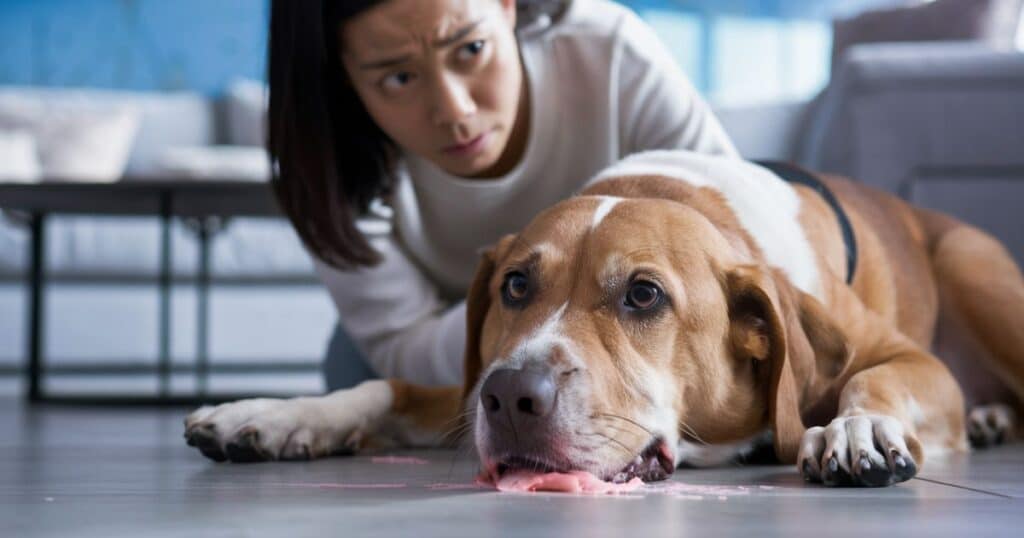
During the observation period, it’s essential to provide your dog with a calm and comfortable environment. Stress can exacerbate gastrointestinal issues, so try to minimize any sources of anxiety or disturbance.
Additionally, take note of the time and approximate amount of goose droppings ingested, as this information can be helpful for your veterinarian in determining the appropriate course of action.
If your dog exhibits any of the following symptoms, it’s essential to seek immediate veterinary attention:
- Persistent vomiting or diarrhea lasting more than 24 hours
- Bloody diarrhea
- Severe lethargy or weakness
- Refusal to eat or drink
- High fever
- Abdominal pain or discomfort
These signs may indicate a more serious underlying condition, such as a bacterial or parasitic infection, and prompt veterinary treatment is necessary to prevent further complications.
Ensure Access to Fresh Water
Immediately after ingesting goose poop, providing your dog with ample fresh water can help flush out any potential contaminants from their digestive system. Encourage your dog to drink water, but avoid forcing them to consume large quantities, as this may induce vomiting.
Ensuring proper hydration is crucial, as diarrhea and vomiting can quickly lead to dehydration, which can exacerbate the situation. Dehydration can also make it more difficult for your dog’s body to fight off potential infections and recover from illness.
If your dog is reluctant to drink water, you can try offering them a low-sodium broth or electrolyte-rich fluids to encourage hydration. However, it’s essential to consult with your veterinarian before introducing any new fluids or supplements, as they may have specific recommendations based on your dog’s individual needs.
When to Consult a Vet if Your Dog Gets Sick from Eating Goose
While mild cases of goose poop ingestion may not require immediate veterinary attention, it’s essential to seek professional help if your dog exhibits any of the following symptoms:
- Persistent vomiting or diarrhea lasting more than 24 hours
- Bloody diarrhea
- Severe lethargy or weakness
- Refusal to eat or drink
- Fever
- Abdominal pain or discomfort
These signs may indicate a more serious underlying condition, such as a bacterial or parasitic infection, and prompt veterinary treatment may be necessary to prevent further complications.
Your veterinarian may recommend specific tests, such as fecal examinations or blood work, to identify the causative agent and determine the appropriate course of treatment. Depending on the severity of the case, your dog may require oral or intravenous fluids, antibiotics, or other medications to manage their condition effectively.
In some instances, your veterinarian may recommend hospitalization for supportive care, especially if your dog is severely dehydrated or exhibiting signs of sepsis or other life-threatening complications.
“It’s always better to be safe than sorry when it comes to your pet’s health. If you have any doubts or concerns after your dog has ingested goose droppings, don’t hesitate to consult your veterinarian,”
Advises Dr. Emily Patterson, DVM.
Potential Treatments and Medications
Depending on the severity of your dog’s condition and the underlying cause, your veterinarian may recommend various treatments and medications. Here are some common options:
- Antibiotics: If your dog is diagnosed with a bacterial infection, such as salmonellosis or campylobacteriosis, your veterinarian may prescribe a course of antibiotics to help fight off the infection.
- Anti-parasitic medications: In cases where your dog has contracted a parasitic infection like giardiasis or cryptosporidiosis, anti-parasitic medications may be prescribed to eliminate the parasites from your dog’s digestive system.
- Fluid therapy: If your dog is severely dehydrated due to vomiting or diarrhea, your veterinarian may recommend fluid therapy through intravenous (IV) or subcutaneous fluids to replenish lost fluids and electrolytes.
- Anti-nausea medications: To help manage vomiting and nausea, your veterinarian may prescribe anti-nausea medications, such as maropitant or metoclopramide.
- Anti-diarrheal medications: In cases of severe diarrhea, your veterinarian may recommend anti-diarrheal medications like loperamide or kaolin-pectin supplements to help firm up the stools and reduce the risk of dehydration.
- Probiotics: Probiotics can help restore the balance of beneficial bacteria in your dog’s digestive system, which may have been disrupted by the ingestion of goose droppings or the subsequent medications.
- Dietary changes: Your veterinarian may recommend a temporary change to a bland, easily digestible diet, such as boiled chicken and rice, to allow your dog’s digestive system to recover.
It’s crucial to follow your veterinarian’s instructions carefully and complete the full course of any prescribed medications to ensure a complete recovery and prevent the recurrence of symptoms.
Monitoring and Follow-Up Care
Even after your dog has received treatment and their symptoms have subsided, it’s essential to continue monitoring their health and provide appropriate follow-up care. Here are some recommended steps:
- Gradually reintroduce regular diet: Once your dog’s digestive system has recovered, gradually reintroduce their regular diet over a few days, monitoring for any signs of relapse or discomfort.
- Follow-up fecal testing: Your veterinarian may recommend follow-up fecal testing to ensure that any parasitic infections have been effectively eliminated.
- Monitor for recurring symptoms: Keep a close eye on your dog for any recurring symptoms, such as vomiting, diarrhea, or loss of appetite, as these may indicate that the treatment was ineffective or that a new infection has developed.
- Provide supportive care: During the recovery period, ensure that your dog has access to plenty of fresh water, a quiet and comfortable resting area, and any prescribed medications or supplements.
- Implement preventative measures: Once your dog has fully recovered, implement preventative measures, such as avoiding areas with high concentrations of geese, providing proper training, and ensuring a balanced diet and regular deworming, to reduce the likelihood of future incidents.
By following these steps and maintaining open communication with your veterinarian, you can help ensure your dog’s complete recovery and long-term health after ingesting goose droppings.
Preventing Your Dog from Eating Goose Poop
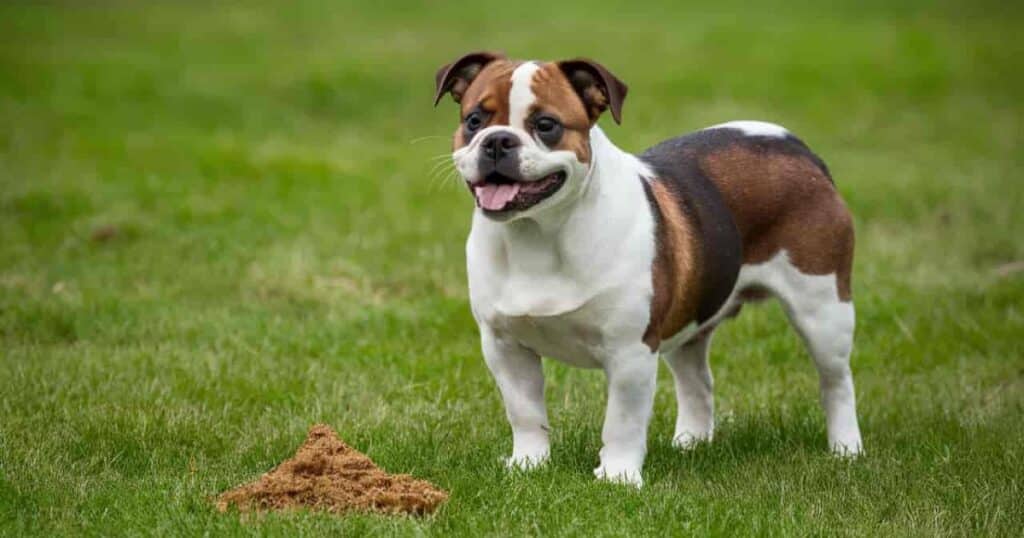
While accidents can happen, it’s essential to take proactive measures to prevent your dog from consuming goose feces in the first place. Here are some effective strategies:
Avoid Areas Where Geese Congregate
Geese often congregate in areas with bodies of water, such as ponds, lakes, or rivers, leaving behind significant amounts of droppings. If possible, avoid walking your dog in these areas or keep them on a leash to prevent them from ingesting goose feces.
If you live in an area with a high population of geese, consider alternative walking routes or locations for your dog’s daily exercise and playtime. You can also research local parks or trails that are known to have lower concentrations of geese and their droppings.
Additionally, be mindful of seasonal changes and patterns in goose migration and populations. During certain times of the year, geese may be more prevalent in certain areas, increasing the risk of your dog encountering their droppings.
Training Commands to Stop Your Dog from Eating Goose
Positive reinforcement training can be an effective tool in teaching your dog to avoid consuming goose droppings. Commands like “leave it” or “drop it” can be incredibly useful in these situations.
To effectively train these commands, follow these steps:
- Start with basic obedience training: Begin by teaching your dog basic obedience commands, such as “sit,” “stay,” and “come,” to establish a foundation of trust and communication.
- Introduce the “leave it” or “drop it” command: Use high-value treats or toys to encourage your dog to disengage from an item or substance you don’t want them to consume, like goose droppings.
- Practice in controlled environments: Start training in low-distraction environments, gradually increasing the level of difficulty by introducing distractions and practicing in various settings.
- Consistently reinforce: Consistently reinforce these commands with high-value treats and praise when your dog leaves the goose poop alone. Over time, this training will help your dog develop self-control and resist the temptation to ingest the droppings.
- Maintain consistency: Ensure that all family members use the same commands and reinforcement techniques to avoid confusing your dog.
Remember, positive reinforcement training takes time, patience, and consistency. It’s important to remain calm and avoid punishing your dog if they make mistakes, as this can create negative associations and undermine the training process.
Diet and Deworming to Keep Your Dog from Eating Goose Poop
In some cases, a dog’s desire to consume goose feces may stem from underlying nutritional deficiencies or parasitic infections. Ensuring your dog is fed a balanced and complete diet can help reduce their craving for non-food items like goose droppings.
- Provide a high-quality diet: A well-balanced diet tailored to your dog’s age, size, and activity level can help satisfy their nutritional needs, reducing the temptation to seek out alternative sources of nutrients, like goose droppings.
- Consider supplements: If your veterinarian detects specific nutritional deficiencies, they may recommend supplements to address these imbalances and curb your dog’s appetite for non-food items.
- Rotate protein sources: Rotating different protein sources, such as chicken, beef, fish, and lamb, can help ensure your dog receives a diverse range of nutrients and prevent them from becoming bored with their diet.
Regular deworming, as recommended by your veterinarian, can also help eliminate any potential parasitic infections that may contribute to this behavior. Parasites like roundworms or hookworms can cause nutritional deficiencies and increase your dog’s appetite, leading them to seek out alternative food sources like goose droppings.
By addressing these underlying issues, you can help curb your dog’s appetite for goose feces and promote better overall health and well-being.
Environmental Management and Deterrents
In addition to training and dietary measures, environmental management and deterrents can also be effective in preventing your dog from consuming goose droppings.
- Fencing or barriers: If you live in an area with a high concentration of geese, consider installing fencing or barriers around your property to prevent the geese from accessing your yard and leaving droppings.
- Deterrent sprays or repellents: There are various commercial deterrent sprays or repellents designed to discourage geese from congregating in specific areas. These products typically contain natural ingredients like grape extract or methyl anthranilate, which are unpleasant to geese but safe for use around pets and humans.
- Visual and auditory deterrents: Visual deterrents, such as decoys or reflective objects, and auditory deterrents, like predator calls or ultrasonic devices, can also be effective in discouraging geese from settling in certain areas.
- Habitat modification: Modifying the habitat around your property to make it less attractive to geese can also help reduce their presence. This may include removing or reducing standing water, allowing grass to grow longer, or planting vegetation that is unappealing to geese.
It’s important to note that some deterrents may require permits or approval from local authorities, and their effectiveness can vary depending on the specific situation. It’s always a good idea to consult with local wildlife management professionals or your veterinarian for guidance on the most appropriate and humane methods for your area.
Conclusion: Understanding and Acting When Your Dog Eats Goose Poop
While it may be an unpleasant sight, it’s not uncommon for dogs to consume goose droppings. However, it’s crucial to recognize the potential risks associated with this behavior and take appropriate action to safeguard your pet’s health.
Remember, prevention is key. By being vigilant, avoiding areas with high concentrations of geese, providing proper training, ensuring a balanced diet and regular deworming, and employing appropriate environmental management techniques, you can significantly reduce the likelihood of your dog ingesting goose feces.
If your dog does consume goose droppings, closely monitor them for any signs of illness and seek veterinary attention if necessary. Early intervention and prompt treatment can prevent further complications and ensure your furry friend’s well-being.
By understanding the reasons behind this behavior, the potential hazards involved, and the appropriate steps to take, you can better protect your dog’s health and enjoy a worry-free, rewarding relationship with your beloved companion.
MORE POST: The Tan Labrador Retriever: A Comprehensive Guide
FAQ’s
What happens if my dog eats geese poop?
Eating geese poop can expose your dog to harmful bacteria like Salmonella, Campylobacter, and parasites like Giardia, potentially causing vomiting, diarrhea, fever, and other gastrointestinal issues. Monitor your dog closely and seek veterinary attention if symptoms persist.
Can dogs get parvo from geese poop?
No, dogs cannot contract parvovirus directly from geese poop. Parvovirus is a virus specific to dogs and is typically spread through direct contact with infected dogs or their feces, not from other animal droppings like those of geese.
Can dogs get coccidia from goose poop?
Yes, it is possible for dogs to contract coccidia, a microscopic parasitic infection, from ingesting goose droppings contaminated with coccidia oocysts. Coccidia can cause diarrhea, dehydration, and other gastrointestinal problems in dogs.
What to do if your dog eats bird poop?
If your dog eats bird poop, monitor them closely for signs of illness like vomiting, diarrhea, or lethargy. Provide plenty of fresh water and contact your veterinarian, especially if symptoms persist, as bird droppings can harbor harmful bacteria and parasites.
How do you treat a dog that eats poop?
Treatment for a dog that eats poop (coprophagia) may involve deworming, dietary changes, behavior modification training, environmental management, and addressing any underlying medical or nutritional issues. Seek veterinary guidance for the appropriate treatment plan.
What happens if your dog accidentally eats poop?
If your dog accidentally ingests poop, they may experience gastrointestinal upset like vomiting, diarrhea, or abdominal discomfort. Monitor for signs of illness, provide plenty of fresh water, and contact your veterinarian, especially if symptoms persist or worsen.

Davin Connor is an experienced author with 3 years in pets writing. Known for concise, informative content, he shares expertise on pet care, behavior, and health through his engaging articles.
